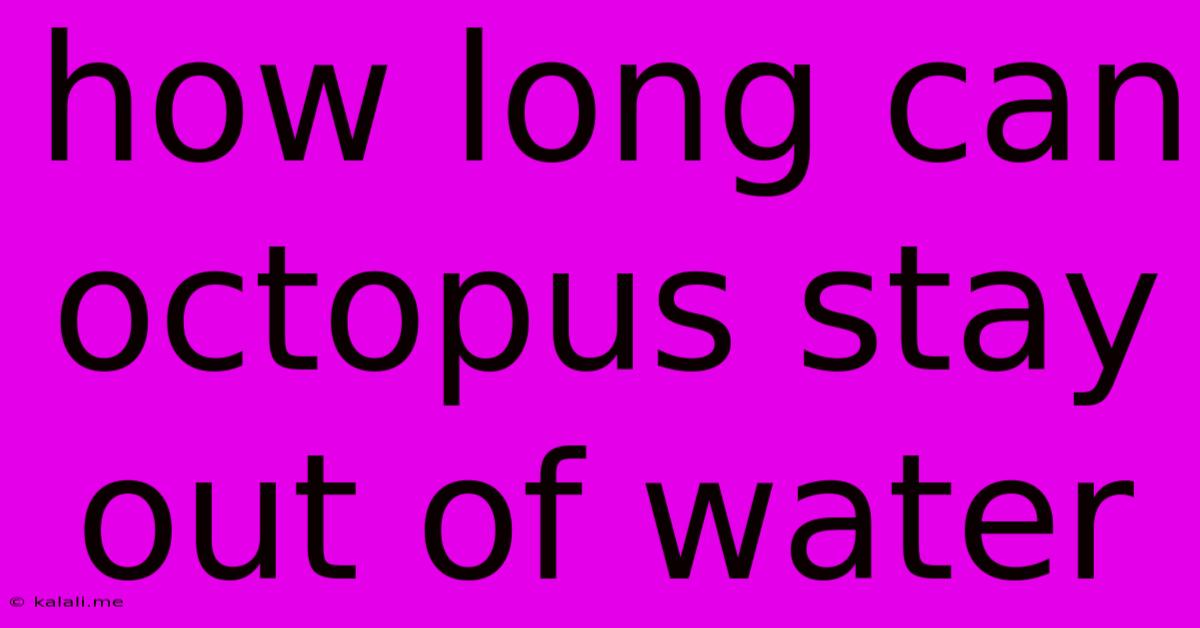How Long Can Octopus Stay Out Of Water
Kalali
Jun 03, 2025 · 3 min read

Table of Contents
How Long Can an Octopus Stay Out of Water? A Look at Cephalopod Survival
Octopuses, with their intelligence and captivating camouflage abilities, are fascinating creatures. But how long can these masters of disguise survive outside their watery domain? The answer, unfortunately, isn't a simple one, as it depends on several crucial factors. This article delves into the intricacies of octopus survival out of water, examining the physiological limitations and environmental influences that determine their lifespan on land.
Understanding Octopus Physiology
Octopuses are aquatic animals; their entire biology is geared towards life underwater. Their gills extract oxygen from the water, and their skin is highly permeable, meaning it readily loses moisture. This makes prolonged exposure to air incredibly stressful and ultimately lethal. Unlike some amphibious creatures, octopuses lack adaptations for breathing air directly.
Factors Affecting Survival Time Out of Water
Several factors influence how long an octopus can survive out of water:
-
Species: Different octopus species may exhibit varying tolerances to air exposure. Larger species with larger gill chambers may survive slightly longer than smaller species. However, there's limited scientific research directly comparing survival times across various species.
-
Size and Age: Smaller, younger octopuses generally have less resilience and are more likely to succumb to dehydration faster than larger, mature individuals. Their smaller gill chambers and higher metabolic rate contribute to this vulnerability.
-
Environmental Conditions: Temperature and humidity play significant roles. A cooler, humid environment will prolong survival compared to a hot, dry one. High temperatures accelerate dehydration, while humidity helps to slow down moisture loss.
-
Stress Level: Stress from handling or being caught significantly impacts survival time. A stressed octopus will expend more energy, leading to faster dehydration and exhaustion.
The Critical Issue: Dehydration
The primary cause of death for an octopus out of water is dehydration. Their skin is highly permeable, allowing water to evaporate rapidly in air. This leads to organ failure and ultimately death. Even in humid conditions, dehydration remains a significant threat.
How Long, Exactly?
There's no definitive answer to the question "How long can an octopus stay out of water?". While some anecdotal accounts might describe octopuses surviving for a few minutes, this can be highly variable based on the factors mentioned above. It's crucial to understand that even short periods out of water are extremely stressful and can be fatal. A few minutes might be possible in ideal, humid conditions, but significantly longer periods are exceptionally unlikely.
The Importance of Conservation
The delicate nature of octopuses underscores the importance of protecting their marine habitats. Maintaining healthy ocean ecosystems is vital for the survival of these remarkable creatures. Any interaction with octopuses should be conducted with utmost care and respect, minimizing stress and ensuring their quick return to the water.
Conclusion: Keep Octopuses in Water!
In conclusion, octopuses cannot survive for extended periods out of water. Their physiological makeup makes them highly susceptible to dehydration, and even short periods of air exposure can be lethal. Respecting their natural environment and minimizing human interaction is crucial for the wellbeing of these fascinating cephalopods. Always prioritize their safety and ensure they are promptly returned to the water if found out of their natural habitat.
Latest Posts
Latest Posts
-
Tallest Mountain Underwater In The World
Jun 05, 2025
-
How To Find Leak In Tire
Jun 05, 2025
-
How To Keep Cheese On Pizza
Jun 05, 2025
-
How Do You Defrost Pizza Dough
Jun 05, 2025
-
How To Replace A Tub Diverter
Jun 05, 2025
Related Post
Thank you for visiting our website which covers about How Long Can Octopus Stay Out Of Water . We hope the information provided has been useful to you. Feel free to contact us if you have any questions or need further assistance. See you next time and don't miss to bookmark.